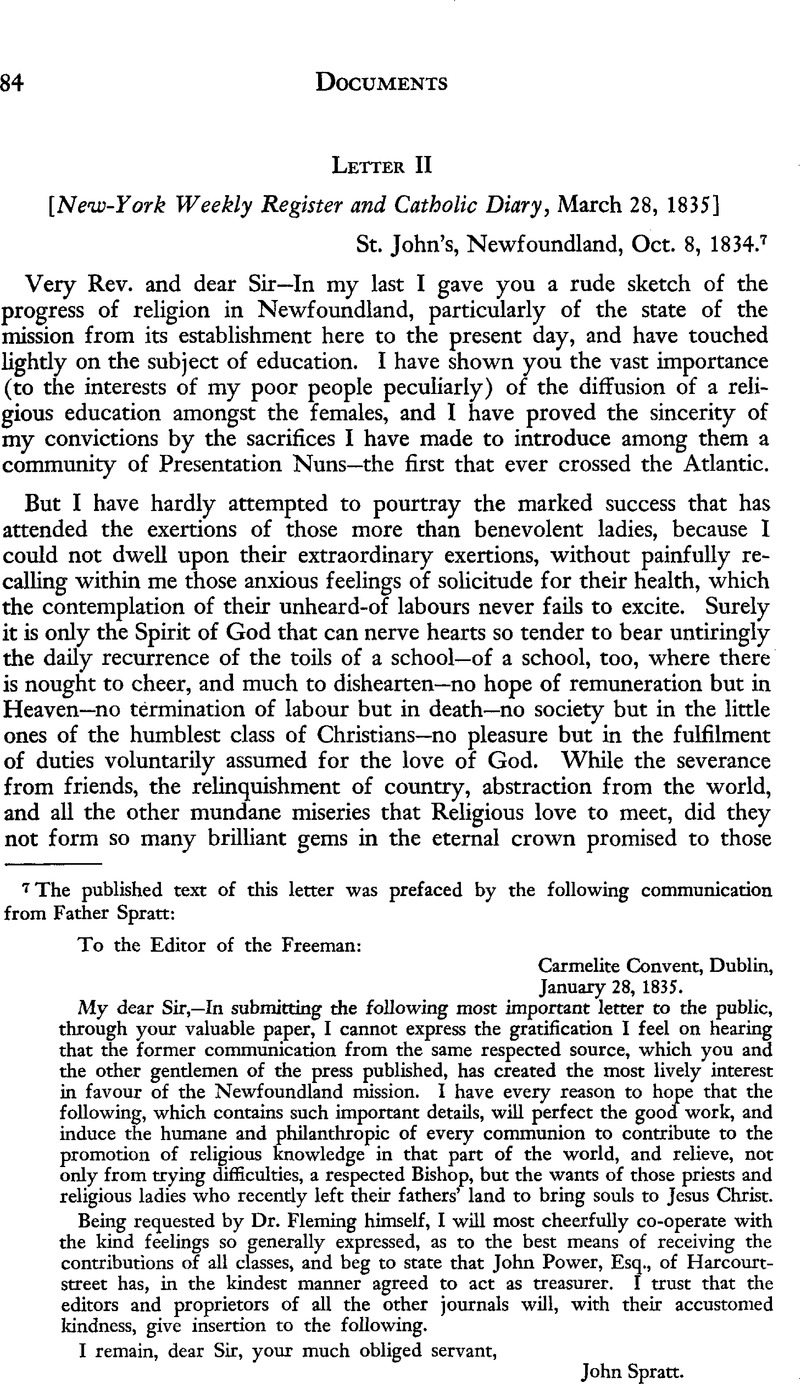No CrossRef data available.
Article contents
Letter II
Published online by Cambridge University Press: 11 December 2015
Abstract

- Type
- Documents
- Information
- Copyright
- Copyright © Academy of American Franciscan History 1950
References
7 The published text of this letter was prefaced by the following communication from Father Spratt:
To the Editor of the Freeman:
Carmelite Convent, Dublin, January 28, 1835.
My dear Sir,—In submitting the following most important letter to the public, through your valuable paper, I cannot express the gratification I feel on hearing that the former communication from the same respected source, which you and the other gentlemen of the press published, has created the most lively interest in favour of the Newfoundland mission. I have every reason to hope that the following, which contains such important details, will perfect the good work, and induce the humane and philanthropic of every communion to contribute to the promotion of religious knowledge in that part of the world, and relieve, not only from trying difficulties, a respected Bishop, but the wants of those priests and religious ladies who recently left their fathers’ land to bring souls to Jesus Christ.
Being requested by Dr. Fleming himself, I will most cheerfully co-operate with the kind feelings so generally expressed, as to the best means of receiving the contributions of all classes, and beg to state that John Power, Esq., of Harcourtstreet has, in the kindest manner agreed to act as treasurer. I trust that the editors and proprietors of all the other journals will, with their accustomed kindness, give insertion to the following.
I remain, dear Sir, your much obliged servant,
John Spratt.
8 The published text carries the following editorial footnote:
The Governor of Newfoundland required a return of all marriages celebrated by Catholic priests, with a fee of fourteen pence, currency, for each. A few weeks after the elevation of Dr. Fleming to the See, he was waited on by the proper officers for the usual return, and the fees which were now somewhat in arrear. The return was made, but Dr. Fleming peremptorily refused to pay the fees, and the demand was not repeated.
9 The published text carries the following editorial footnote:
The Protestant rector required a return of the burials of Catholics, and the sum of twelve and sixpence, as the burial fees for every individual, even of those buried in the Catholic burial ground.—This was scrupulously exacted during the administration of Dr. O’Donel, the first bishop of the island, down to the last hour of Dr. Scallan, the immediate predecessor of Dr. Fleming; and as poverty could not even claim an exemption from the rector’s fee, scarce a week ever passed without witnessing the heartsickening exhibition of a party (friends to the deceased) collecting pence from door to door, to meet this cruel impost; but a prompt refusal upon the accession of Dr. Fleming, prevented the repetition of the demand.
10 The Rev. Charles Dalton was an Irish Franciscan who answered the appeal of Bishop Fleming for missionaries. He arrived in Newfoundland in 1831 and was assigned to Harbor Grace where he remained for thirty years. He built the nave of the subsequent Cathedral of Harbor Grace. His nephew, Father Charles Dalton, became the first Bishop of Harbor Grace (Howley, op. cit., 266).
11 The published text carries the following footnote:
Dr. Fleming met in this harbour one of the native American Indians, and promised to return next June to meet the several Indian tribes of that coast at the river exploits.
12 The Most Rev. John MacHale, who in 1834 had been named Archbishop of Tuam, in Ireland. A vigorous Irish patriot, he wrote and labored incessantly throughout his long episcopate to promote the national aspirations and economic welfare of the Irish people. His biography may be found in the book of Bernard O’Reilly, John MacHale, Archbishop of Tuam, His Life and Correspondence (2 vols., New York, 1890).
13 Daniel O’Connell, Irish statesman, popularly known as “the Liberator.” A leading figure in the struggle for Catholic Emancipation in the British Isles, he also advocated the repeal of the legislative union of Ireland with England and the abrogation of the iniquitous economic and social legislation then prevailing in Ireland. He died at Genoa, Italy, May 15, 1847. For the biography of O’Connell, see Michael MacDonagh, Life of Daniel O’Connell (St. Louis, 1905), and Dunlop, Robert, Daniel O’Connell and the Revival of National Life in Ireland (New York and London, 1900)Google Scholar.


